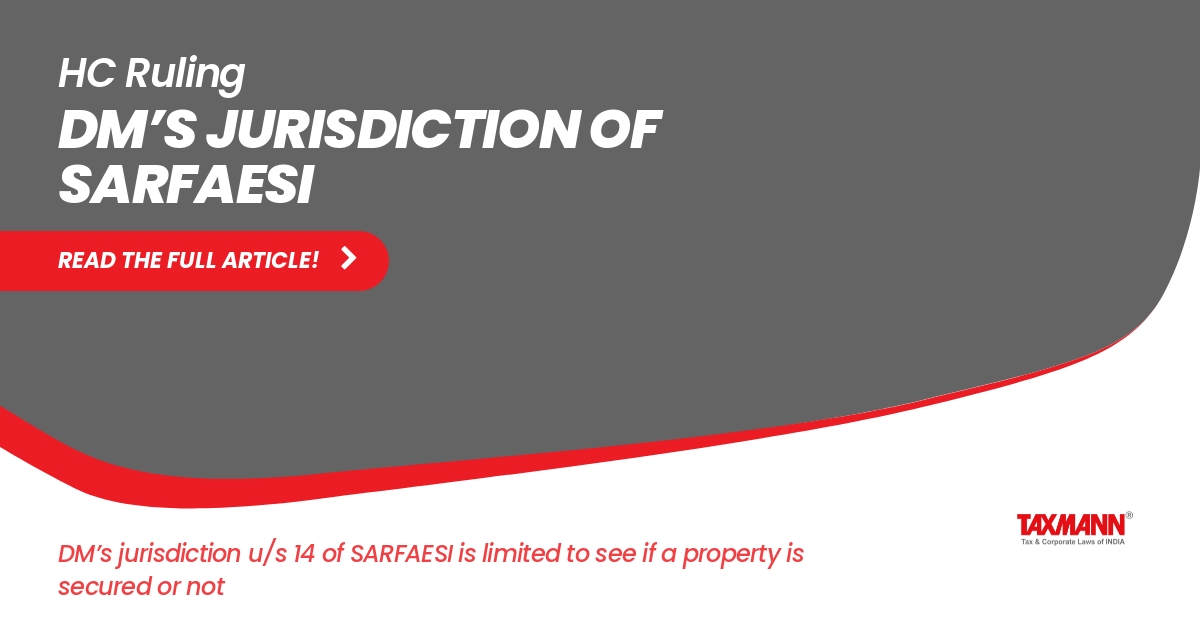DM’s jurisdiction u/s 14 of SARFAESI is limited to see if a property is secured or not: HC
- Blog|News|FEMA & Banking|
- 2 Min Read
- By Taxmann
- |
- Last Updated on 28 March, 2022

Case Details: Adams Marketing (P.) Ltd. v. State Bank of India - [2022] 136 taxmann.com 136 (Calcutta)
Judiciary and Counsel Details
-
- Kesang Doma Bhutia, J.
- Siddhartha Banerjee, Debashiskarmakr and Arya Nandi for the Petitioner.
- Jishnusaha and Shiv Mangal Singh for the Respondent.
Facts of the Case
In the instant case, the petitioner had obtained the loan from the respondent bank. The Properties of the Petitioner were mortgaged with a view to securing the said loan. Loan having remained unpaid, the bank thus, approached District Magistrate under section 14 of the SARFAESI Act, 2002 for assistance in taking possession of secured assets, which was allowed by the District Magistrate.
Challenging the order passed by the District Magistrate, the petitioner filed an application on the ground that they were never made aware of proceeding under section 14 by the District Magistrate by serving notice of same, and thus, said order was passed without adhering to the principle of natural justice.
The Petitioners filed a review application and contended that even if the statutory remedy is provided under the statute, it does not take away the power of superintendence enshrined under article 227 of the Constitution of India.
High Court Held
The High Court noted that the jurisdiction of the District Magistrate under section 14 is limited i.e. to see whether the property is a secured asset or not. Further, section 14 nowhere discloses that before passing an order, District Collector needs to put the borrower on notice or had to hear the borrower. Dismissing the application filed against the order of the District Magistrate, the High Court held that question of violation of the principle of natural justice by District Magistrate in a proceeding under section 14 did not arise.
Disclaimer: The content/information published on the website is only for general information of the user and shall not be construed as legal advice. While the Taxmann has exercised reasonable efforts to ensure the veracity of information/content published, Taxmann shall be under no liability in any manner whatsoever for incorrect information, if any.

Taxmann Publications has a dedicated in-house Research & Editorial Team. This team consists of a team of Chartered Accountants, Company Secretaries, and Lawyers. This team works under the guidance and supervision of editor-in-chief Mr Rakesh Bhargava.
The Research and Editorial Team is responsible for developing reliable and accurate content for the readers. The team follows the six-sigma approach to achieve the benchmark of zero error in its publications and research platforms. The team ensures that the following publication guidelines are thoroughly followed while developing the content:
- The statutory material is obtained only from the authorized and reliable sources
- All the latest developments in the judicial and legislative fields are covered
- Prepare the analytical write-ups on current, controversial, and important issues to help the readers to understand the concept and its implications
- Every content published by Taxmann is complete, accurate and lucid
- All evidence-based statements are supported with proper reference to Section, Circular No., Notification No. or citations
- The golden rules of grammar, style and consistency are thoroughly followed
- Font and size that’s easy to read and remain consistent across all imprint and digital publications are applied



 CA | CS | CMA
CA | CS | CMA
